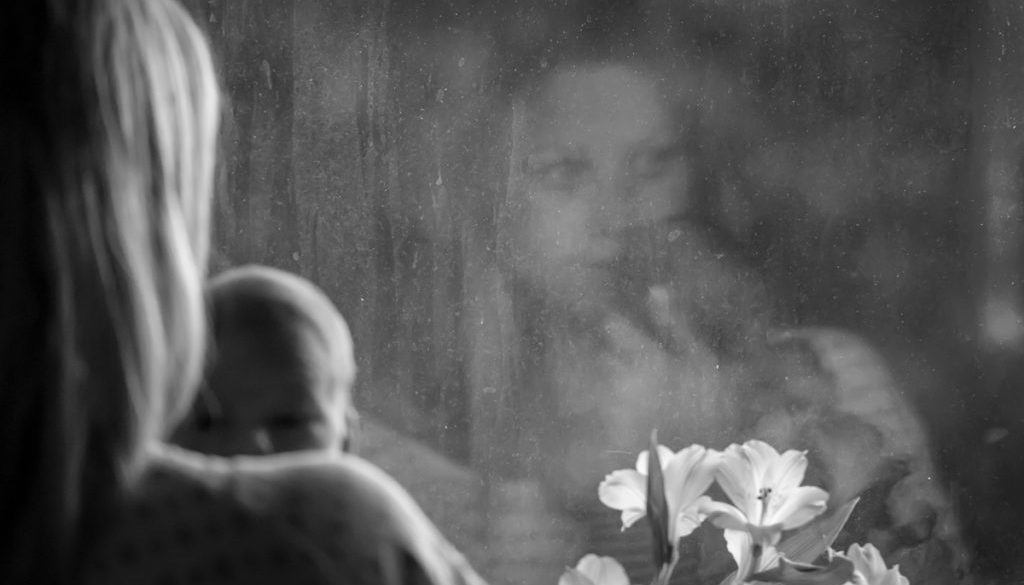Baby Blues or something more?

Having a baby or adding a baby to your family in any way, changes everything about one’s world. Frankly, your life will never be the same as it was pre-baby. Despite it being different, having a baby is supposed to be one of the happiest times of a new parent’s life. Society tells us to that to be a good parent, the second a baby is born, we should be filled with joy, happiness, pride, immediate and endless love, the knowledge of how to do all the right things to take care of the baby, and the patience and energy to put that knowledge into action. What is so rarely talked about are the tremendous physical, emotional, and social changes that come with the birth or adoption of a new baby. Remember, giving birth is as taxing on the body as running a full marathon, but instead of the rest and water you get after the marathon, a new mother must immediately start feeding, diapering, rocking, and caring for a new human being, all while experiencing hormonal shifts, sleep deprivation, and physical recovery of a c-section or vaginal delivery. So, what happens when your expectations of parenthood don’t match with your new reality? Below, we will look at the spectrum of postpartum emotions, ranging from the Baby Blues to the “normal crazy,” to postpartum mental health disorders to postpartum psychosis. As you read this, if you believe that you or someone you know may have a postpartum mental health disorder, remember this: you are not alone, you are not to blame, and with help, you will be well (Postpartum Support International).
Baby Blues
Almost all new parents have heard of Baby Blues or The Blues, but what are they really? Baby Blues occur within the first few days after giving birth and usually dissipate after 1-2 weeks, with all symptoms being gone by 2-4 weeks. Baby Blues are very common, with 50-80% of all new mothers experiencing them. Symptoms of Baby Blues typically include, crying, exhaustion, insomnia, irritability, anger, tension, and anxiety. These symptoms tend to come and go and will typically improve with sleep and appropriate support. Baby Blues are often only slightly bothersome and will usually go away on their own without additional intervention.
Normal Adjustment or “Normal Crazy” and Postpartum Exhaustion
If you are more than a few weeks postpartum and still experiencing negative symptoms similar to those of the Baby Blues, you likely have moved along the continuum to normal adjustment or “normal crazy.”
Normal adjustment after having a baby typically occurs through the first 2 months postpartum. During this time, a mother may experience symptoms similar to the Baby Blues that last just a bit longer. These symptoms can include crying/tearfulness, irritability, mood swings, sleep disturbances, anger, dysphoria (negative mood), and appetite changes. With normal adjustment or “normal crazy,” symptoms are “on again, off again,” with a mixture of good and bad days.
Like normal adjustment, postpartum exhaustion also occurs through the first 2 months after having a baby. Mothers who experience postpartum exhaustion feel pretty good psychologically, meaning no symptoms of depression or anxiety, but do often feel overwhelmed, “bone-tired,” unable to function, and have physical symptoms such as headaches and stomachaches.
Postpartum Depression
If you continue to have many symptoms of the Baby Blues and are 6-8 weeks postpartum, you may be experiencing a postpartum mood disorder like postpartum depression. Postpartum depression or “PPD” occurs in 10-20% of all new mothers. PPD can occur very quickly in the first few weeks, or it can have a slow and gradual onset over a period of 2 months or more. PPD can occur anytime within the first year after having a baby. Symptoms of PPD are more severe and longer lasting than those of the Baby Blues and typically impact a mother’s ability to function normally. Symptoms commonly include irritability, anxiety/worry, crying/tearfulness, anger, difficulty sleeping (especially returning to sleep), exhaustion, negative mood, loss of interest in activities, rapid mood changes, extreme changes in appetite, lack of energy, problems with concentration, and physical symptoms (headaches, stomachaches). Women with PPD often report feeling helpless, hopeless, and inadequate, specifically like she may not be a good mother. Some mothers who experience PPD may also experience thoughts of suicide which can feel very scary. PPD is most commonly treated with a combination of medications and therapy, and you should always talk to your OB, psychiatrist, or general physician if you believe you may be experiencing it.
Postpartum Bipolar Disorder
Postpartum bipolar disorder or postpartum mania usually begins immediately after giving birth but can begin any time within the first year postpartum. Symptoms include restlessness, agitation, feeling “speeded up,” little need for sleep, poor concentration, racing thoughts, distractibility, fast/pressured speech, emotionally reactive, mood swings, and impulsiveness. Parents who experience postpartum bipolar disorder have trouble relaxing or slowing down and may seem like they are thinking faster than they can talk, although their speech will likely be very fast as well. Just as with PPD, postpartum bipolar is commonly treated with mediation and therapy.
Postpartum Anxiety Disorders
While PPD involves changes to a mother’s mood, postpartum anxiety disorders usually consist of feelings of intense and constant worry or panic. Postpartum anxiety can occur alone or along with PPD and symptoms can begin within the first few weeks after giving birth but may not reach troubling levels until a few weeks later. While most symptoms occur 6-8 weeks postpartum, onset can occur anytime within the first year after having a baby. Up to 28% of new mothers experience intense anxiety, with about 10% of new mothers having symptoms severe enough to be diagnosed with one or more forms of postpartum anxiety disorders. Worry and anxiety can either be specific to the baby, or nonspecific and focused on general life. Within the category of postpartum anxiety disorders are postpartum panic disorder and postpartum obsessive-compulsive disorder.
Postpartum Panic Disorder
With postpartum panic disorder, most mothers report panic attacks that “come out of the blue.” Symptoms of panic attacks include extreme anxiety without specific triggers, sensation of choking, shortness of breath, chest pains, tingling in hands/feet, trembling/shaking, sweating, faintness, hot/cold flashes, dizziness, extreme irritability, and fear of dying, going crazy, or losing control. Many people who experience panic attacks feel as if they are having a heart attack. Postpartum panic disorder can feel very scary and make it difficult to function.
Postpartum Obsessive-Compulsive Disorder
Postpartum obsessive-compulsive disorder or OCD occurs when a parent experiences persistent, repetitive, and distressing thoughts, ideas, or images. These thoughts happen spontaneously within the first few weeks postpartum and often center on harming the baby. Violent thoughts of harming one’s baby are very common with postpartum OCD; however, the parent is repulsed by these thoughts and very rarely has an urge to act on them. These thoughts usually cause the parent to feel hatred and disgust towards themselves. While some parents with postpartum OCD perform ritualistic behaviors (i.e. excessive handwashing for fear of germs, avoiding bathing for fear of drowning, hiding knives to avoid harming the baby, etc.) most parents will only experience the repetitive and upsetting thoughts of harm coming to the baby or thoughts of harming the baby themselves.
Postpartum Posttraumatic Stress Disorder
About 7% of women will experience postpartum posttraumatic stress disorder (PTSD)… wow that’s a mouthful. Postpartum PTSD can occur in any mother who has a history of trauma, related or unrelated to the birthing experience. Postpartum PTSD can be more common in mothers who have life-threatening complications for themselves or the baby during or shortly after the birthing process, but postpartum PTSD can also be more common in women who have a history of sexual assault. Symptoms of Postpartum PTSD include panic attacks in response to specific situations, sensation of returning to the traumatic event, nightmares about the traumatic event, emotional numbness (inability to feel anything), and avoiding situations that remind them of the traumatic event.
Postpartum Psychosis
On the spectrum of postpartum emotions and mental health disorder, postpartum psychosis or postpartum thought disorders are the most severe, but also the rarest with only 1-2 new mothers in 1000 experiencing it. Symptoms can be mild to severe and tend to progress rapidly. It usually lasts for several days but can last for a few weeks if left untreated. Symptoms include hallucinations (seeing or hearing voices or images that others cannot), delusions (ideas that don’t match reality), refusal to eat, inability to sleep, poor judgment or decision-making, extreme confusion, disorientation, sudden & irrational mood changes, and thoughts of harming the baby. Most women who experience postpartum psychosis are hospitalized until they are stable and able to return to their normal lives fairly quickly. Postpartum psychosis is a medical emergency and if you or someone you know is experiencing these symptoms, call 911 or go to the nearest emergency room.
It can be overwhelming to hear about the mental health issues that can happen during and shortly after giving birth, but they are so important to talk about. It can feel very isolating to new parents who don’t match the image of the always-happy, perfectly-put-together, sitcom parent ala June Cleaver from Leave it to Beaver. Becoming a parent is the hardest job there it. It is nonstop, historically undervalued, and physically exhausting. The expectations that society places on new parents, especially new mothers, are nearly impossible to live up to. Throw in some sleep deprivation and raging hormones, and it is no wonder so many mothers are at risk for postpartum mental health disorders beyond the Baby Blues. As Postpartum Support International reminds us though: you are not alone, you are not to blame, and with help, you will be well.
If you feel you may be struggling with any of the above issues, please contact your OB or other physician, the Postpartum Support International Helpline at 1-800-944-4773, and the therapy program at Forty Carrots Family Center to see how we can help support you. YOU ARE NOT ALONE. YOU ARE NOT TO BLAME. WITH HELP, YOU WILL BE WELL.
*Disclaimer: while we recognize the changes that are experienced by all types of families after the arrival of a new baby, many of the physical changes that go along with perinatal mental health issues discussed in this article focus directly on the person who has given birth. We further recognize and respect that not all people who give birth identify as women or mothers; however, as research primarily uses the term “mother” to describe a person in this role, we will also use that terminology for the sake of consistency.
Information from:
Dunnewold, A., Sanford, D. G., & Tse, G. (2010). Life will never be the same: The real mom’s postpartum survival guide. Dallas, TX: Real Moms Ink.
Postpartum Support International – PSI from https://www.postpartum.net/
Supporting Parents & Families from https://www.maternalmentalhealthnow.org/





